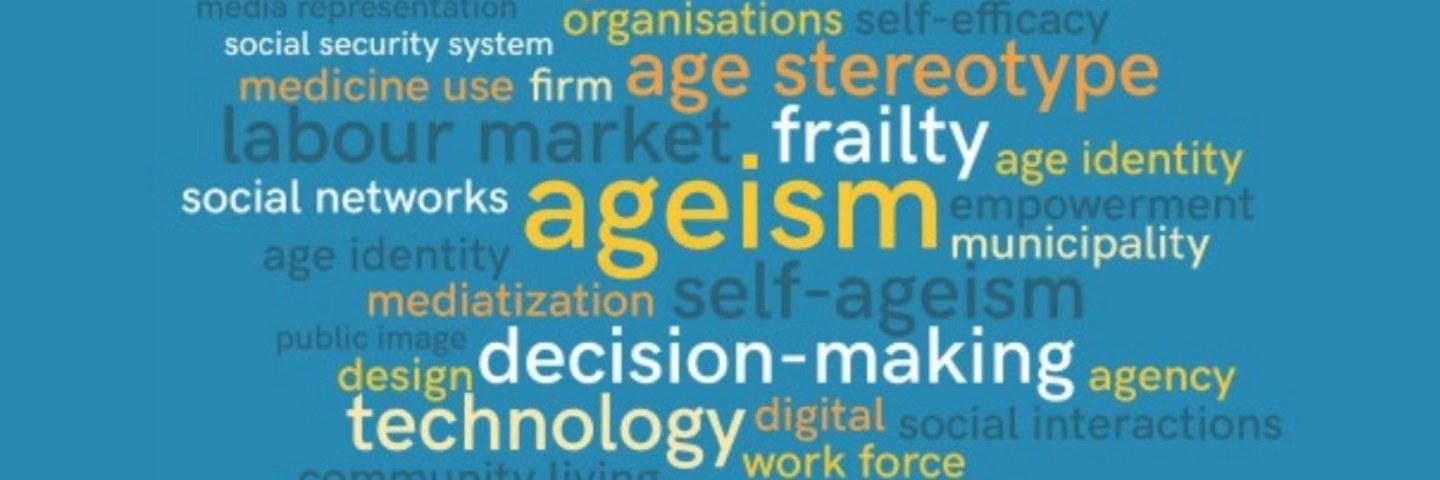
EuroAgeism is a multi-disciplinary, multi-sectorial, science-policy-oriented international network of researchers, policy makers and social and health care professionals. The network is dedicated to the training of a new generation of Early Stage Researchers (ESRs) in the field of ageism: the complex and often negative construction of old age. Tampere University hosts two early stage researchers, whose research projects focus on ageism in the working life.

Background
Ageism is defined as stereotypes, prejudice and discrimination towards people because of their age. Ageism is the most widespread -ism especially due to its implicit nature. Europe has a societal mandate to lead research and policy in the field.
Europe has the largest percentage of older adults worldwide. Yet, there is a high prevalence of ageism; the complex and often negative construction of old age, in society at large, and among researchers and practitioners in particular. In contrast to the wide prevalence of ageism, the majority of research, to date, has targeted racism and sexism and neglected to address ageism. A similar neglect is found on the policy side, as age is still not an explicit part of a U.N. declaration of human rights. To address these shortcomings, EuroAgeism is focused on harmonising different theoretical and methodological disciplines in the field of ageism. It aims to bring together science and policy by creating an opportunity for a true dialogue that will allow graduates of the program to capture positions as scientists, educators, science advisers, policy advocates, lobbyists, or legislators in the field of ageism.
Goal
EuroAgeism will advance the field by delivering an attractive multi-disciplinary (social science, health science, and design), inter-sectorial (academia, healthcare, non-governmental, inter-governmental, and governmental organizations), and international (North, East, and Central Europe, Middle East, Pan-European, and international) research, training and supervision programme on ageism.
The research conducted within EuroAgeism is a direct response to the European Commission’s Active and Healthy Ageing initiative, with an overarching goal to improve the quality of life of older people.
The two projects developed in Tampere University are:
- Emerging Workspaces in Ageing Societies: Ageism and Near-Retirement People. Doctoral Researcher Katri Keskinen.
The project explores the dynamics of labour market participation and exit trajectories from the perspective of older near-retirement workers. The study assumes that while measures towards prolonging work careers is an urgently outspoken goal in most ageing societies, age bias and ageist attitudes still work against age-inclusiveness in the workforce. Using qualitative longitudinal methodology, the study will produce an empirically-based understanding of work profiles and retirement pathways as they unfold over time. The study expands on previous, predominantly quantitative or panel research studies and yields novel knowledge on the agency, decision-making and participation of near-retirement people. A status report on ageism and one’s career and retirement trajectories and a policy paper will be the main products.
- The Grass-Roots of Ageism: The Dynamics of Ageist Practice in Institutional Interaction. Doctoral Researcher Federica Previtali
Using data from carefully selected institutional and professional sites, this project looks at age dynamics and ageist practice in (inter)action. Central empirical focus will be given to key client -professional, employer – employee encounters to enable detailed scrutiny of ageism as it unfolds on the everyday grass-root level. Utilizing conversation and discourse analytic perspectives and methodology, the project yields details of how ageist practice is born, sustained and challenged in and through situated language use. The study assumes that such understanding of the key characteristics, and the dynamic unfolding of –isms-in-interaction, represents a crucial step towards working against such practice. The project sets out to map current ageist or age-inclusive institutional and professional practice. Through this mapping, the project also ameliorates the deleterious effects of ageism. The results will provide research-based forms of intervention and support for the schooling through which new professional best practice and policy can be implemented.
Impact
The overall goal of the network is to train professionals that can function effectively and comfortably at any of the intersections between science and policy.
We aim to achieve the following goals: a) explore ways to improve the active participation of older adults in the workforce; b) address ageism in relation to access to goods and services, and c) promote an age-friendly society, which helps older adults to realize their full potential. EuroAgeism is dedicated to dissemination of the findings to policy stakeholders and the public to decrease ageism in everyday life, in clinical and in social practice.
Funding source
This project has received funding from the European Union’s Horizon 2020 research and innovation programme under the Marie Skłodowska-Curie grant agreement No 764632.
Coordinating organisation
Bar-Ilan University, Israel
People
Pirjo Nikander
Research Director, tutkijakoulu Pirjo Nikander
Pirjo NikanderJohanna Ruusuvuori
Professor, Professor Johanna Ruusuvuori
Johanna RuusuvuoriPartners
Alliance: Health and Social Care Alliance Scotland (AL, Scotland)
EMDA – The Alzheimer’s Association Israel (AAI, Israel)
European Centre for Social Welfare Policy and Research (EuroCentre, Austria)
Finnish Centre for Pensions (Finland)
National Insurance Institute in Israel (NII, Israel)
National University of Ireland Galway (Ireland)
Peking University (China)
United Nations Economic Commission for Europe (UNECE, Switzerland)
United Nations Economic and Social Commission for Asia and the Pacific (UNESCAP, Thailand)
World Health Organization (WHO, Switzerland)
Co-operators
Age Platform Europe (Belgium)
Bar-llan University (Israel)
Charles University (Czech Republic)
Fontys University of Applied Science (The Netherlands)
Jagiellonian University (Poland)
Linköping University (Sweden)Robert Gordon University (UK)
Tampere University (Finland)
Contact persons
Doctoral researcher Katri Keskinen, katri.keskinen(at)tuni.fi [for requests in Finnish]
Doctoral researcher Federica Previtali, federica.previtali(at)tuni.fi [for requests in English]
PI Dr. Pirjo Nikander, pirjo.nikander(at)tuni.fi
